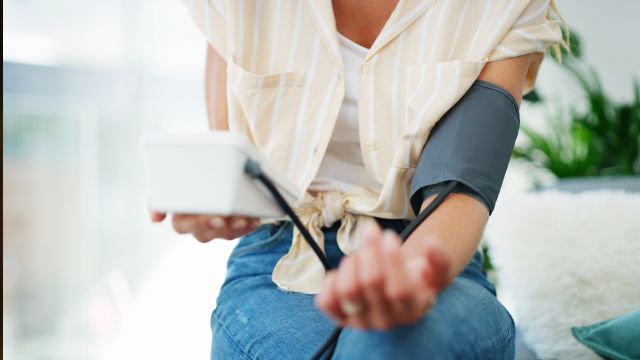When we hear "high blood pressure," most of us think about cutting back on sodium. But the causes of high blood pressure are so much more complex than eating too much salt. In fact, only about 5% to 10% of people with high blood pressure will ever know the exact cause.
To really get a grasp on the causes of high blood pressure – and what makes your numbers creep up, up, up over time, you have to pan back—waaay back—and look at several body systems.
The big picture: What is high blood pressure?
Your blood pressure is a measurement of the force of your blood against your artery walls as the blood passes through. If the pressure is too high, that force can literally gouge holes in your arteries over time. Yikes!
Exercise, strong emotions, and other stimulating things can temporarily raise blood pressure. And blood pressure varies—it tends to be lower at night during sleep and higher in the morning, so it's best to get accurate self-measurement numbers.
When your blood pressure dips high or low, your body is supposed to compensate and help keep blood pressure in check. When it doesn't, there could be a problem within any number of body systems, including your heart, your nervous system, your kidneys, and certain hormone systems.
Your pumping station
Your heart and arteries have a big impact on blood pressure. The amount of blood your heart pumps, how wide or narrow your arteries are, and the volume of blood in your bloodstream all affect your blood pressure. If your arteries are too narrow, if you have greater-than-normal blood volume, or if your heart beats more forcefully than it should, high blood pressure can occur. The question is, what causes these things to happen? It's not always clear.
Your nerves
Your autonomic nervous system is a key blood pressure player. It helps regulate your blood pressure by setting off a series of events in response to low or high blood pressure.
When your blood pressure dips too low—or when your body needs to prime itself to take sudden action against a perceived threat, such as during times of stress or fear—the sympathetic part of the autonomic nervous system temporarily raises blood pressure. It does this by influencing chemical messengers that affect the speed and force of your heartbeat and the size of your blood vessels.
When your blood pressure is too high, or when it's time for sleep or rest, the parasympathetic part of the autonomic nervous system kicks in, conserving energy and releasing acetylcholine, a neurotransmitter that slows down your heart.
It's not clear if dysfunction of the autonomic nervous system may contribute to hypertension in some way. Recent research does show that the sympathetic nervous system may be overactive in some people with hypertension.
Your beans
Your kidneys—those bean-shaped organs that flank your spine—also play a pivotal role in keeping blood pressure in a healthy range. The kidneys' main trick for doing this is to excrete just enough salt and water to keep cell fluids balanced and blood volume optimal for healthy blood pressure.
If the kidneys are functioning properly, they release more sodium in response to higher salt consumption. Your kidneys might also temporarily excrete less sodium, thanks to a little kick in the butt from the autonomic nervous system when blood pressure is too low.
But if your kidneys aren't doing their job quite right for some reason, chronic increases in blood volume and extracellular fluid volume can occur, resulting in high blood pressure.
Your hormones
The kidneys also make an enzyme—renin—that's tied in with a hormonal blood pressure control system (called the renin-angiotensin-aldosterone cascade). Here's how it works:
- Renin triggers the production of angiotensin, a substance that makes small arteries constrict, which in turn increases blood pressure. Angiotensin also triggers the release of aldosterone, a hormone that causes the kidneys to hold onto sodium and excrete potassium—both of which cause water to be retained and thus blood pressure to creep up.
If this renin-hormone system is too active, it could cause high blood pressure. But what might make it overactive? It's a question that scientists continue to study.
So what does it all mean?
As you can see, there's a whole lot factors to consider when looking at the causes of high blood pressure – and how to control it. And while you may never know the exact cause of your high blood pressure, there is plenty of research showing what will help control it. Eating a DASH-style diet, losing weight if you need to, exercising a little more, cutting back on alcohol—and yes, cutting back on salt—are all smart and proven choices for getting blood pressure numbers down.
And it's well worth the effort when you think of the health issues that come with high numbers—like heart attack, stroke, and kidney disease.






